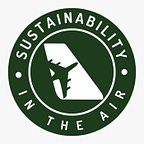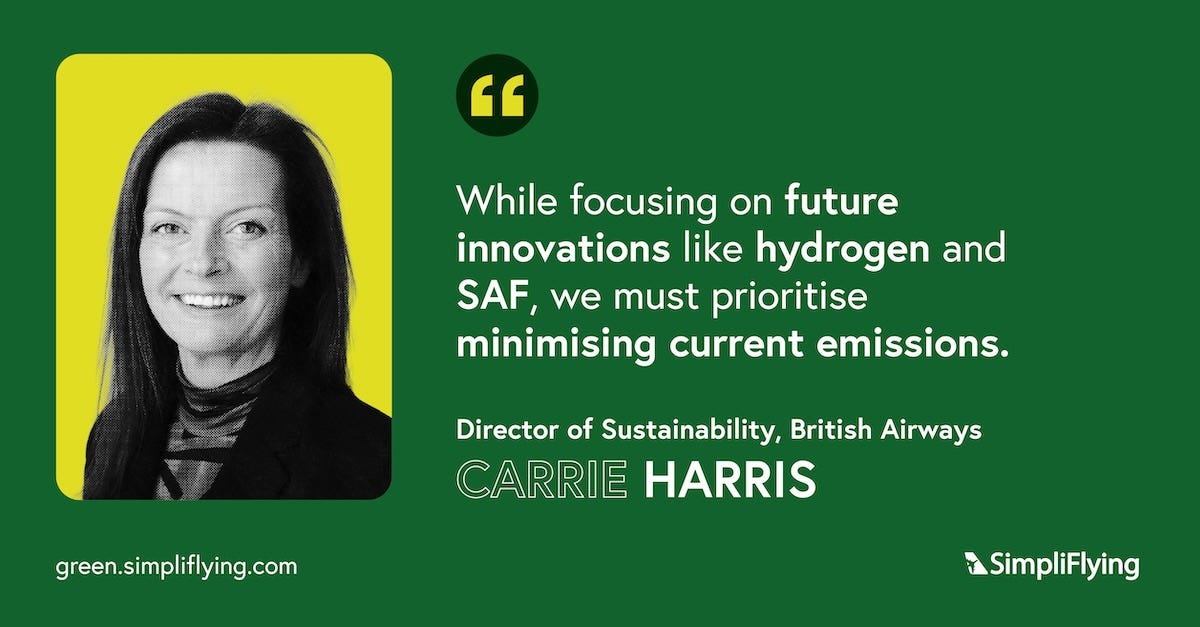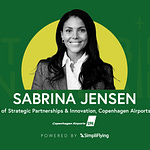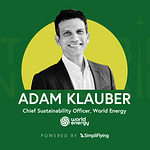In this episode of our ‘Sustainability in the Air’ podcast, Carrie Harris, Director of Sustainability at British Airways, speaks with SimpliFlying CEO Shashank Nigam and shares the airline’s commitment to net zero, and their overarching BA Better World sustainability strategy.
Harris’ entire career has been focused primarily on aviation sustainability, combining her passion for aviation and the environment. She has previously worked at the air traffic control service company NATS and British Airways’ parent company International Airlines Group (IAG).
Here are the key highlights of the conversation:
BA better world strategy (7:39)
Encouraging employee engagement (15:52)
The Co2llaborate platform (20:07)
BA’s Sustainable Aviation Fuel strategy (22:48)
How BA is enhancing operational efficiencies (34:12)
Improving cabin experience (39:29)
Non-co2 emissions (46:01)
Rapid Fire! (48:31)
Keep reading for a quick overview of the episode.
Why employee engagement matters
One of the primary areas of focus of British Airways’ (BA) sustainability strategy is creating awareness and engagement across its workforce. With requisite knowledge of sustainability, employees are empowered to become ambassadors for the airline and drive the change the industry needs.
BA utilizes a comprehensive communications mix, including a dedicated intranet site, events, workshops, and podcasts, tailored to its globally mobile workforce.
To encourage community engagement, employees are offered vouchers for charity contributions.
Recognition is also given through BA Better World awards, celebrating those who demonstrate leadership in sustainability.
Recently, BA organised a full-day sustainability workshop for 200 of its top leaders, to deepen their understanding of the climate crisis and the airline’s sustainability strategy. This initiative, Harris explains, underscores the message that sustainability is not just the task of a small central team but a collective responsibility for all within the organization.
Initiatives such as these have resulted in a substantial increase in employee engagement, Harris states, growing from 17% to 60% within two and a half years.
5 ways British Airways is shaping a greener future of aviation
1. BA Better World strategy
In 2021, BA announced its BA Better World sustainability programme, describing it as its ‘most important journey yet’.
Through this initiative, the airline aims to embed sustainability into its core strategy, marking its commitment to ecological responsibility.
BA has pledged to achieve net-zero carbon emissions by 2050. This goal is underpinned by a series of phased initiatives:
Enhancing operational efficiency and fleet modernization for immediate impact,
Increasing the use of sustainable aviation fuels (SAF) derived from waste in the near term,
For the future, investing in breakthrough technologies like hydrogen-powered aircraft and carbon capture.
These efforts, Harris adds, align with BA’s vision of fostering a sustainable world, with the collective efforts of employees, customers, and partners.
“BA Better World embodies that principle of sustainability which has been ingrained as part of our [corporate] strategy. It really sets a landmark to show our commitment and to set out what we meant by sustainability, and how we're going to engage our people in that,” says Harris.
2. Sustainable Aviation Fuel
Harris emphasises the pressing need to decarbonise aviation, as inaction would result in escalating emissions. SAF will be a significant driver of aviation sustainability, and is likely to constitute 50-70% of fuel use by 2050, she adds.
SAF is an essential element of BA’s net zero strategy. BA’s parent group IAG was one of the first airline groups worldwide to commit to achieving net zero carbon emissions by 2050. IAG has also committed to powering 10% of its flights with SAF by 2030, and has nearly $865m investment in SAF purchases. BA currently utilises SAF for about 1% of its total fuel, predominantly at Heathrow, says Harris.
“Globally, the availability of SAF is still less than half a percent of what aviation needs. So we’re pleased to be at 1%. But obviously, we’ve got a long way to go to reach 10% by 2030.”
Harris also shares BA’s SAF partnerships that include the Phillips 66 used cooking oil SAF plant in the UK that BA currently uses, a LanzaJet plant in Georgia that converts alcohol to jet fuel, and the upcoming Project Speedbird. BA also has power-to-liquid technology based SAF plants in the works, she adds.
3. The CO2llaborate platform and climate action
BA has been integrating sustainability into the customer experience from booking to flying, evolving its approach based on consumer feedback and environmental efficacy.
Harris acknowledges airlines’ duty to educate passengers on the climate effects of flying and to offer mitigation options.
For example, in 2022, BA launched the CO2llaborate platform, in partnership with climate technology company CHOOOSE. The platform enables customers to understand, calculate and address their travel emissions. Passengers also have the flexibility to choose from SAF and certified carbon removal credits. Moreover, the platform is available to both individual and corporate customers before, during or after the trip.
4. Improving operational efficiencies
Emphasising the importance of operational efficiencies, Harris states that such strategies are immediate solutions that airlines can use to cut carbon emissions.
Some measures that BA employs include:
Ground operations powered by 100% renewable electricity,
Introducing electric Mototok tugs,
Transitioning diesel vehicles to Hydrotreated vegetable oil (HVO) biofuels,
Using preconditioned air units powered by renewables instead of the auxiliary power unit,
Single-engine taxiing.
Harris also highlights the role pilots can play in cutting emissions – efficient flying techniques can reduce up to 45,000 tonnes of CO2 annually.
Harris further details BA’s strides in waste reduction, with over 100 tonnes of plastic eliminated through initiatives like replacing plastic wrapping with paper and removing plastic from headsets.
5. Non-CO2 emissions
There’s an increasing consensus on the significance of non-CO2 effects, such as contrails, which recent studies suggest have a more substantial warming effect than previously thought. To address contrails, it is essential to enhance contrail prediction technologies and develop effective mitigation strategies.
BA has partnered with Breakthrough Energy and Imperial College London to study which flights are most likely to produce significant contrails.
The study shows that about 10% of flights are responsible for the most impactful contrails, suggesting that targeted mitigation could be highly effective.
BA is also conducting research to understand SAF’s full potential in mitigating non-CO2 climate impacts.
‘Sustainability in the Air’ is the world’s leading podcast dedicated to sustainable aviation. Through in-depth conversations with top aviation leaders, we break through the clutter and provide a clear roadmap for a net-zero future.














